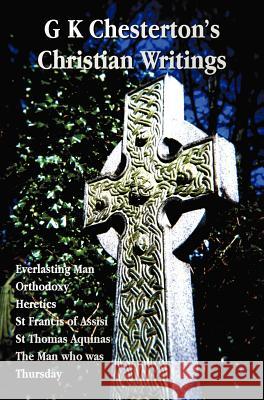G K Chesterton's Christian Writings (Unabridged): Everlasting Man, Orthodoxy, Heretics, St Francis of Assisi, St. Thomas Aquinas and the Man Who Was T » książka
G K Chesterton's Christian Writings (Unabridged): Everlasting Man, Orthodoxy, Heretics, St Francis of Assisi, St. Thomas Aquinas and the Man Who Was T
ISBN-13: 9781781393208 / Angielski / Twarda / 2012 / 724 str.
G K Chesterton's Christian Writings (Unabridged): Everlasting Man, Orthodoxy, Heretics, St Francis of Assisi, St. Thomas Aquinas and the Man Who Was T
ISBN-13: 9781781393208 / Angielski / Twarda / 2012 / 724 str.
(netto: 335,10 VAT: 5%)
Najniższa cena z 30 dni: 325,89 zł
ok. 13-18 dni roboczych.
Darmowa dostawa!
This Omnibus edition of g K Chestertons writings includes the following complete and unabridged classic books: The Everlasting Man. What makes the human uniquely human? This is the question that G.K. Chesterton starts with in this exploration of human history. Chesterton responds to H.G. Wells, affirming the uniqueness of being human and the message of the Christian faith. Chesterton refutes the idea of Social Darwinism, which claims that we have been gradually evolving from the barbaric to the civilised state we currently find ourselves in. He sees Christianity as a blend of reason and story, which satisfies both the mind and the heart. Orthodoxy. Chesterton explores "right thinking" and explains how it led him to come to faith. This is a very personal account of his conversion, but Chesterton makes it clear that for him it was as a result of his scholarly examination of Christianitys arguments. Heretics. Chesterton is at his very witty best in this collection of twenty articles. He focussed his brilliant mind on "heretics", prominent figures who Chesterton considers theologically wrong , including Kipling, Shaw, Wells, and Whistler. St Francis of Assisi. Francis of Assisi is without doubt on of the greatest saints, and hugely influential in human history. This biography by G. K. Chesterton is considered to be the greatest tribute to this great mans life and one that fully appreciates what St Francis offered to humanity. St Thomas Aquinas. This Biography of St Thomas Aquinas ranks as one of the best books ever written on the life and thought of this great saint. Aquinas was shy and dubbed "the Dumb Ox" by his classmates. Little did they know that he was an unparalleled genius and would revolutionise Christian thought. The Man who was Thursday. This book is included because like much of G. K. Chestertons fiction, it is full of Christian allegory. This is a true masterpiece, a psychological thriller that weaves its way around seven anarchists who are called by the names of the days of the week. The aim of the book is to expose moral relativism and nihilism for the evil that they are.











